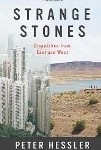Review of Peter Hessler's (China 1996-98) Strange Stones-Dispatches from East and West
 Strange Stones—Dispatches from East and West
Strange Stones—Dispatches from East and West
By Peter Hessler (China 1996-98)
Harper Perennial trade paperback; $14.99
354 pages
May 2013
Reviewed by Richard Lipez (Ethiopia 1962-64)
Strange Stones is Peter Hessler’s fourth book that’s all or mostly about China, and it’s as fresh, meaty, and irresistible as the acclaimed three others, Country Driving, Oracle Bones , and his exemplary Peace Corps memoir, River Town . The new book is a collection of eighteen pieces, most of which first appeared in The New Yorker, where Hessler is a staff writer now reporting from Cairo .
Having picked up some anti-Chinese sentiment in Thailand and Burma , I’ve never been all that eager to set foot in the Peoples Republic . Their neighbors to the south tend to regard the Chinese as aggressive, exploitive and rude, and I’ve witnessed a good deal of this behavior. I have more favorable second thoughts about the Chinese, though, whenever I read Hessler. He tells story after story of decent, often sweet people struggling to do well and behave well in a place where the ground is often shifting under their feet. One of his most unnerving observations is that the Chinese are in a lot of ways like Americans with their energy, optimism and faith in the future. Their business practices resemble ours, too—in 1890. If I ever take the plunge and visit China , I have a feeling that for better or worse I might feel right at home.
Which is not to say there isn’t plenty about China that’s strange as strange can be, including the industrialization of just about everything. In a piece called “Chinese Barbizon” about a development area near the city of Lishui, tens of thousands of workers on assembly lines are cranking out not just manhole covers and bra-strap rings, but cityscapes of Venice. Yes, Lishui is the source of hundreds of thousands of cheap paintings sold in Europe and North America . A former art student named Chen Meizi specializes in scenes of Venice and can produce a pretty one in a couple of days. Does she enjoy her work? No, it’s just a factory job, but it beats the dreary life back in her home village.
The migration of hundreds of millions of Chinese from the poor countryside to less poor urban areas in search of a toehold in the modern world is China ‘s story of our time, and Hessler does a masterful job of recording the particulars of this great social revolution. Chen Meizi’s job is atypical, but her motives are like nearly everybody else’s: find a little stability, a little comfort, work hard and get ahead. This isn’t easy; plant managers are often sadists or letches, and in OSHA-less China , industrial accidents are common. But it’s worth playing the game in order to get a nice new pair of shoes or even, after a while, maybe a car.
Hessler writes with a sly wit, and his take on the new Age of the Automobile in China is revealing and often funny. A frenzy of freeway building, Hessler reports, resulted when Condi Rice mentioned to a high official that as a child she came to love America on car trips with her family. So family excursions were a great way to instill patriotism! The exploding Chinese auto industry is succeeding largely by stealing designs from foreign companies. An official who filched car plans from GM-Daewoo insisted to Hessler it was okay to do this. The Chinese auto industry is young, he said, and young artists must copy the old masters before they can produce art on their own. Calling this industrial espionage is just sour grapes.
Another revelation for some of us is how real Chinese patriotism is. We read stories in The Times about dissidents, but Hessler reports that most Chinese seem to think their government is okay. It’s partly that the government is making life better for most Chinese, but it’s also pride in Chinese history and a robust xenophobia. In pieces on the Olympics and on basketball and the Yao Ming phenomenon, Hessler shows how little pleasure the Chinese get from sports and how it’s all about waving the red flag and winning, winning, winning. Hessler seems to find this unfortunate and even creepy. He may have missed NBC’s Amero-centric coverage of the Olympics and the American crowds shrieking USA ! USA ! It’s another area where we and the Chinese are oh-so-different and oh-so-alike.
Hessler also includes a couple of pieces on life in the American rural Southwest that are saddening in their depiction of poverty and isolation— though reassuring in the ways decent people look after one another, just as decent people do in rural China. Hessler is such a keen and humane reporter, and I’ll be very eager to see what he has to show us in his first book on turbulent Egypt .
Richard Lipez is a former editorial writer at the Berkshire Eagle in Massachusetts . He writes the Don Strachey private eye novels under the name Richard Stevenson.
No comments yet.
Add your comment